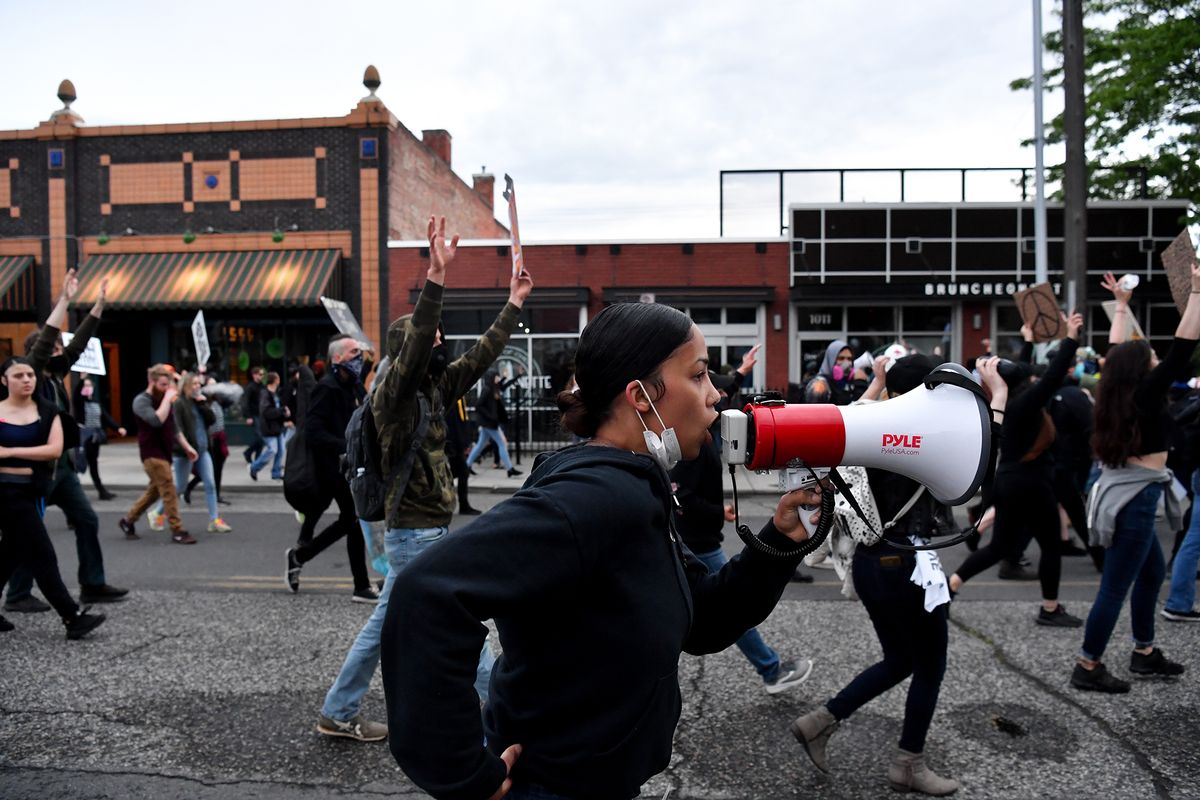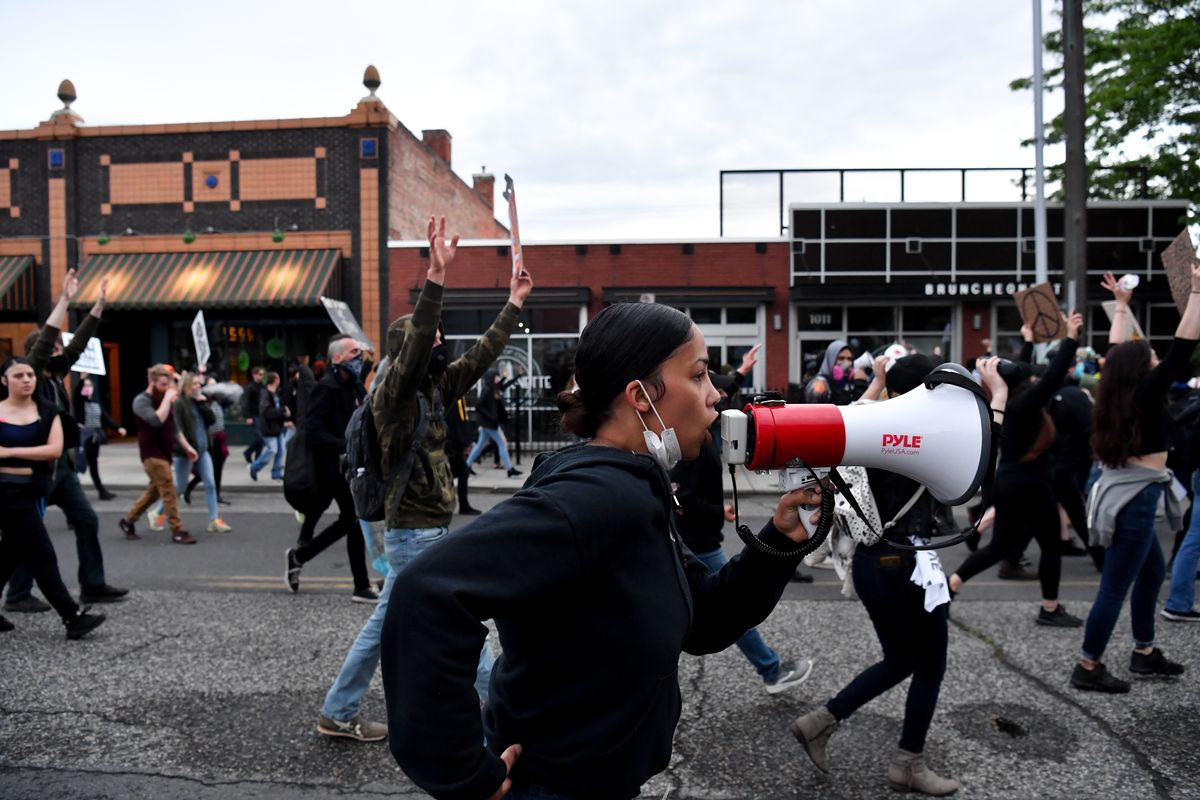‘This is leadership’: Spokane woman turns outrage into awareness to help lead peaceful Spokane protests

After hours of marching with protesters around downtown Spokane on Sunday afternoon, Renee White raised her megaphone.
It was a tense moment as the protesters, tired and directionless, reached the Spokane County Courthouse and confronted dozens of state troopers in riot gear.
“We want to respect y’all but you don’t respect us,” White said, her words carrying above the noise.
The crowd was mesmerized as she seized the moment to speak to both protesters and law enforcement.
In the days that followed, White has been looked upon as an emerging leader.
It was just a few weeks ago that White found herself in a draining struggle. She had lost her job in the midst of a global pandemic. She was anxious, barely leaving her couch.
“Nobody knows what it’s like to be here at the bottom unless you’re in that situation,” White said.
She found the strength to change her life. Another company hired her, and she began looking for ways to further her education.
And then George Floyd died in police custody in Minneapolis. Protests erupted around the world, calling attention to police brutality and systemic racism, including in Spokane.
When looters broke in to the Nike store in Spokane and police responded with tear gas, White said she was upset with the ensuing chaos.
“I saw how unorganized it was out there and how people were just scattered everywhere and didn’t know what do to or how to come together,” she said. “I felt like it was my calling to try to be the center voice for people to come together in the right way.”

White has since been on the front lines of every protest and demonstration, captivating people with her passion.
“Truly, for me, it was reenergizing just to hear the level of commitment from someone so young who just stepped up because they had the personal call and saw the need,” Spokane City Councilwoman Betsy Wilkerson said.
White is the first person of color since Wilkerson took a seat on the council as the only Black member to reach out and ask for help learning about how government works .
White grew up in Detroit. She and her twin sister, who also lives in Spokane, were the second oldest of seven children, six of them born before their mother was 19. In 2013, White’s older brother, Sherif, was shot nine times just a block from their home. His killers were never caught.
“There are rumors out there of who killed him, but the police department out there never did anything,” White said. “It’s a different type of pain when you don’t have justice. When you can’t look the person in the eye who took your loved one away.”
Just two weeks after her older brother’s funeral, White found out she was pregnant. She was 16.
Two years later, White, her siblings and mother moved to Spokane to be closer to White’s grandfather.
“She has always been one of the ones to always speak her mind and never hold her tongue,” Anrico White said of his older sister.
He recalled her speaking out anytime, anywhere as a child, whether in class, at an after-school program or at home.
“She made sure people heard her,” he said. “She’ll give anybody anything, whatever she can do to help, she would give her last.”
When the family moved to Spokane , life in the Inland Northwest was a huge change for the family.
“I’ve never seen so many white people in my life,” White said.
She took a minimum wage job and continued raising her daughter.
Up until a few months ago, White worked at a grocery. The job turned sour, she said.
“What woke me up really was when I experienced work discrimination, unfairness in the workplace,” White said.
In March, White was fired after an altercation with another employee with whom she was in a relationship . The two got into a fight outside the store while they were both off the clock.
After losing her job, White said she had severe anxiety.
“These bills are just piling up and nobody cares that you are alone and that you don’t have anybody,” White said.
White decided to make a change. She started a program online to finish her high school diploma and found a new job as a cashier at a sporting goods store.
“How I calmed myself down was educating myself on what I needed to do to move forward to get out of the situation I was in,” White said.
After a full day of work at her new job, White went downtown to join the George Floyd protest on May 31.
“When I got down there, everything was cool,” White said.
She said she was surprised to see so many white people supporting Black Lives Matter.
Following the main protest that ended at the courthouse, White joined a group that returned downtown and walked along Main Street. They discovered the Nike store had been looted and came upon other protesters blocking the store’s shattered doors to prevent further looting.
Moments later, police launched tear gas into the crowd.
“That outraged me, too,” White said. “They (the looters) weren’t there no more. There were people protecting the place to make sure that nobody else got in there.”
White walked back into Riverfront Park, when police launched another round of tear gas.
“The officers are still out there, lined up like a gang,” White said.
White tried to get officers to come up and talk to her to no avail. Later that night, White said she stopped the looting at the Wells Fargo Building and encouraged others to be peaceful. She left feeling frustrated at the lack of organization and how the protest had devolved.
So the next night she went back to the Red Wagon in the park, where a group of young people, still agitated from being subjected to tear gas the previous night, had already gathered.
White took a megaphone and commanded the crowd’s attention. She encouraged protesters to remain peaceful and engage with elected officials. Two hours after curfew at 10 p.m. White implored the crowd to go home, but to come back the next night.
On the way to her car, White was stopped by a group of police officers who thanked her for what she did.
“They said, ‘We really appreciate that you did that. That’s what we wanted. We stayed back because of what you did,’ ” White recounted.
The next day, when White arrived at the Red Wagon, Kitara Johnson had already set up to give young protesters a microphone, a platform and a supportive audience of parents and other community members.
“When I met Renee, I didn’t know that she had planned a demonstration out at the Red Wagon at 6 p.m.,” Johnson said.
White walked up to Johnson, a little bit sassy, she said, but moments later Johnson handed her a mic.
“There was no more riot gear or tear gas since that night,” Johnson said.
“I looked at her and said, ‘This is leadership.’ She didn’t try to be a leader and people just followed her because of her passion.”
Johnson and White have much in common. Both women were raised in the inner city, Johnson in Chicago and White in Detroit. They both got pregnant at 16 before moving to Spokane and eventually becoming community organizers.
With the Black Lives matter movement gaining momentum nationwide, Johnson said young people in Spokane need a leader like White who can help advocate for policy change.
“I don’t see these young people stopping protesting until there is policy change,” Johnson said.
White took a few days off from protesting before coming out on Sunday after work with her brother, Anrico.
Seeing his sister speak has helped him deal with his brother Sherif’s death and hopefully will prevent other families from having to go through that, Anrico said.
“I actually love seeing it because she has a lot to say,” Anrico said. “We can relate. We know what people are going through. We know when a family is broken up what they are going through.”
White said she was excited for another chance to engage with other young people standing up for their lives on Sunday.
“Instead of a sign, I brought voter registration forms,” White said. “I don’t want people to be out there and to not know who they’re voting for.”
On Monday, White stood in the center of a circle of 50 protesters in front of City Hall. Her goal, she said, was to engage with them, encourage them to vote, share her story and discuss concrete actions to take .
White said she doesn’t just want changes in the Spokane Police Department, but systemic changes in such areas as education and mental health services to combat institutional racism.
“You have to vote,” White told the crowd. “Your life depends on it. Our lives depend on it.”
While White just started educating herself on government systems, that hasn’t stopped her from sharing her new knowledge.
“Did you know that there are two mayors in Spokane?” she asked the crowd before going on to explain that Spokane Valley has its own mayor and City Council.
“Ben Wick, we ain’t forgot about you baby,” White said of the Spokane Valley mayor.
White encouraged everyone to politely email their elected officials to not only demand policy change, but to share their stories in the hope of creating human connections.
Wilkerson, the Spokane councilwoman, said she felt connected to White after the women met Tuesday.
“She actually shared her life, that got her to be where she is at today,” Wilkerson said. “For a young lady of only 29, Renee has probably lived 10 lifetimes.”
White has often talked about Wilkerson’s role as the only black person on the Spokane City Council, a post she was appointed to fill.
“I”m still navigating that myself,” Wilkerson said. “You can learn in a book, but you’ve got to be exposed to the dynamics of it.”
Wilkerson said that entering government work after years of community organizing has been a big learning curve, with much of the detailed information she needs buried in an obscure place she has to dig to find.
“You don’t see a lot of Black people in government because that hasn’t been modeled to us,” Wilkerson said. “In many ways, politics is a family business.”
She has offered to mentor White and help her learn about what it takes to be a Black woman in government.
White said she hopes to study criminal justice at a local community college after earning her high school diploma. Until then, White said she will continue organizing weekly protests and educating herself and others.
“I’m hoping that they can put themselves in our shoes,” White said of her continued advocacy to elected officials. “Feel our pain, feel our struggle and then use it to make change.”
Contact the writer: emmae@spokesman.com, 509-459-5122